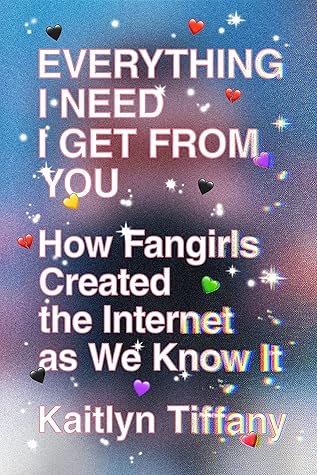More on this book
Community
Kindle Notes & Highlights
Read between
July 31 - August 4, 2023
if i die tonight tell one direction I’ll see them in hell —LISETTE HERNANDEZ, Twitter, 2014
At that, the crowd screams as if they have just found out they’re alive.
If you’re the type of person who still peruses Urban Dictionary, you might notice that “chonce” is defined there: “An alternative for the word ‘chance.’ Commonly used by One Direction’s Niall Horan.”
The cultural phenomena of fandom and the internet are braided together—one can’t be fully understood without the other. Both, in providing structure, have also produced chaos. Both, in providing meaning, have sometimes oversupplied it. Yet fans’ role in shaping our present culture, politics, and social life is often overlooked, and the roots of this oversight go back decades.
Yet a fangirl still exists in contradiction to the dominant culture. She’s not considered normal or sane; her refusal to accept things the way they are is one of her defining characteristics. She is dropping out of the mainstream even while she embraces a thing that is as mainstream as a thing can get.
Online fandom can be progressive, and it can also be reactionary; it can foster creativity, and it can also smooth away individuality; it can create new tools and compel fascinating action just as easily as it can provide the dull, repetitive skills required for activities like media manipulation and harassment.
Their success in that context doesn’t strike me as a coincidence, but the mystery of how so many people were able to find happiness through watching them and talking about them deserves documentation.
By this time, One Direction fans were already boasting that they had stolen security camera footage from at least one hotel (to see Zayn Malik without a shirt on) and an Australian airport (so they could watch Harry Styles just sitting around).
On Twitter, anyone who doesn’t remember all of that is a “local.” This is one of the more casually devastating labels one can acquire in the digital age.
Stan Twitter was molded by these three influences: the emotional valence of Weird Twitter, simultaneously detached and totally out of control; the public-private flattening of Celebrity Twitter, which promised that from now on we would always have access to a behind-the-scenes candor from anyone and everyone; and the tight networking and enthusiastic riffing of Black Twitter, which took the shapelessness of the site and gave it a conversational form.
One Direction made me care about the internet. Time will tell if this was a blessing or the worst thing that ever happened to me.


